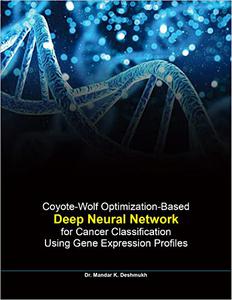
Coyote-Wolf Optimization-Based Deep Neural Network for Cancer Classification Using Gene Expression Profiles by Mandar Deshmukh
English | 2022 | ISBN: N/A | ASIN: B0BG1LM383 | 320 pages | MOBI | 3.79 Mb
Cancer is a deadly disease that affects millions of people all over the world, which stimulates unrestricted segmentation of the cell in the affected tissue. The prior determination of the cancerous cells renders on-time health-care service to the affected persons, which promotes easier life-saving. Hence, there is a need for automatic cancer classification methods. Though there are so many conventional classification methods to determine cancer cells, these methods fail due to their training issues.
A huge number of genes are expressed in gene expression data, which has led to a great number of research that has evaluated and appraised the cancer classification problem using various data mining, statistical, and machine learning-based methodologies. The classification accuracy of many machine learning algorithms has been quite high, and they have had a lot of success in the field of cancer classification. However, there are still certain issues with these methodologies that make the task of categorizing cancers a difficult one. For example, doing statistical analysis on microarray data might be difficult due to a systematic bias in the output of the microarrays as a result of the high level of complexity.
Traditional machine learning (ML) approaches have the limitation that they need pre-engineered structuring of raw input data into structured datasets before they can be used. A limitation of several machine learning algorithms has been their inability to deal with unstructured data, which has limited their effectiveness in the cancer classification task. Unstructured data analysis methods based on the deep learning methodology of constructing neural networks have become more popular in recent years.
Deep learning is a kind of machine learning that uses layered architecture to develop strong models capable of comprehending complex data.
Deep learning is becoming more popular. These algorithms discover important traits during the training phase, which do not need pre-engineering of unstructured input. It was because of this property that DL algorithms were able to compete against standard ML algorithms in a variety of domains such as computer vision and image categorization, as well as speech recognition. Advanced machine learning techniques are particularly beneficial in the early diagnosis of cancers. Regarding breast cancer screening, recent research by NVIDIA revealed that deep learning reduces the error rate by 85 percent. Since deep learning has significant potential to assist medical and paramedical professionals by lowering the rate of human error, assisting in the identification of cancer, and assisting in the interpretation of intricate data, it is worth exploring further.
It is proposed in this book that a classification model named Coyote-Wolf optimization-based Deep Neural network (CoWo-DNN) be used to distinguish cancerous cells from normal tissues. This model is used to differentiate between malignant cells and normal tissues in the body. To categorize cancer cells, the proposed CoWo-DNN takes use of gene expression data that has been log-transformed to aid the effective processing of the data. CoWo-DNN is a deep neural network that has been trained to recognize patterns in data.
The proposed CoWo-DNN approach surpasses previous methods in terms of performance parameters such as Precision rate, Accuracy, Recall, F-measure, and Time Remaining Perceptual Information (TRPI) (TRP). According to the suggested CoWo-DNN, the highest accuracy is 91.8 percent, the precision is 93.7 cents percent, recall is 89.2 cents percent, and the F-measure is 86.4 cents percent in the case of breast cancer.
Regarding colon cancer, the suggested CoWo-DNN obtains the highest accuracy possible (96.2 percent), the highest precision possible (93.3 percent), the highest recall possible (97.8 percent), and the highest F-measure possible (98 percent).
https://1dl.net/sjttfbylrfuf/msduu.C.O.D.N.N.f.C.C.U.G.E.P.rar

https://rapidgator.net/file/6acb216b0e9772e225c3cb33821618b8/msduu.C.O.D.N.N.f.C.C.U.G.E.P.rar.html

https://nitroflare.com/view/3F6FAE0E272AC2C/msduu.C.O.D.N.N.f.C.C.U.G.E.P.rar

https://uploadgig.com/file/download/94753fb5Fd876318/msduu.C.O.D.N.N.f.C.C.U.G.E.P.rar
